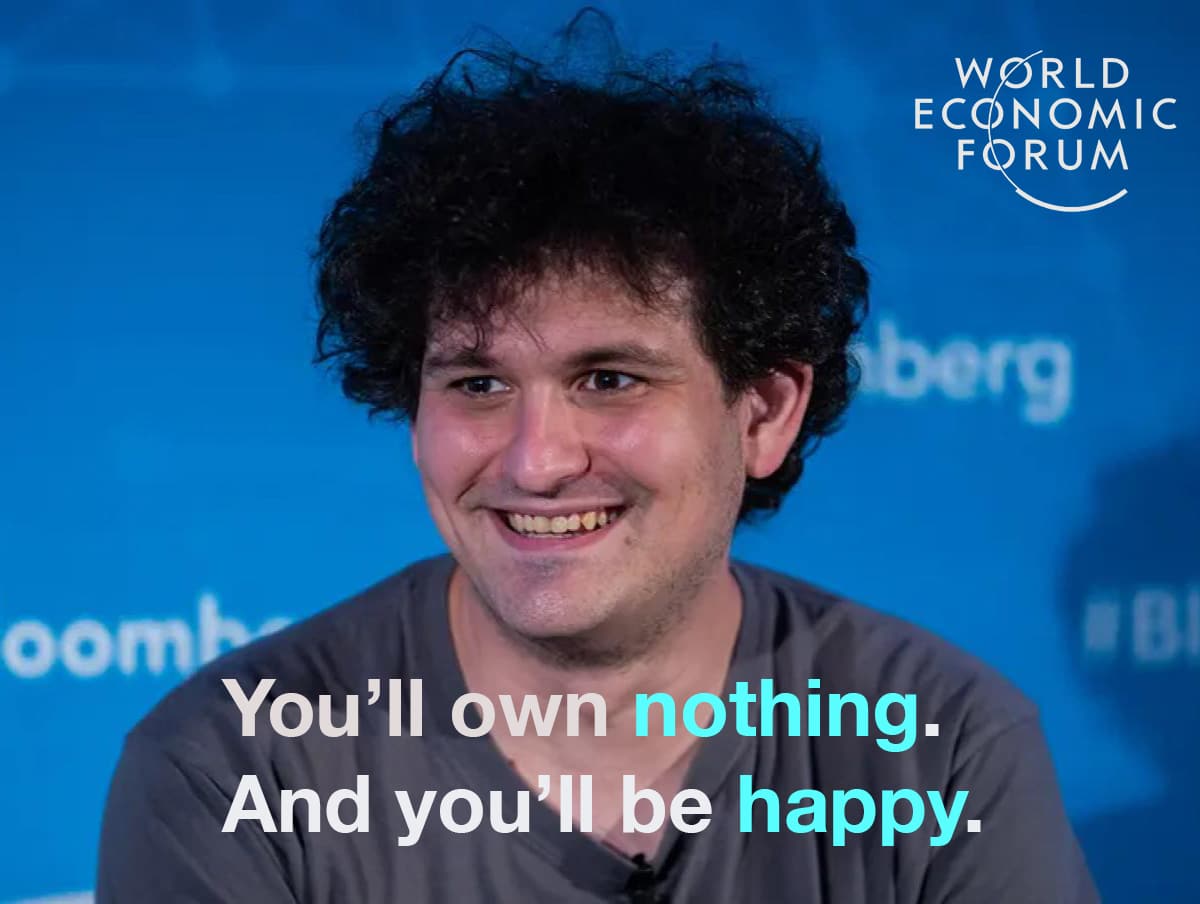

Sam Bankman-Fried’s elitist altruism
Elizabeth Holmes dressed in the same style every day: black turtleneck sweater, black slacks, and black low-slung shoes. This “uniform” underlined her deified status as a busy billionaire dedicated to changing the world, setting her apart from mere mortals with time to choose their clothes. “My mom had me in black turtlenecks when I was, like, eight,” she told one women’s magazine. “I probably have 150 of these. It makes it easy, because every day you put on the same thing and don’t have to think about it — one less thing in your life. All my focus is on the work. I take it so seriously; I’m sure that translates into how I dress.”
Yet this story of her image, like the blood-test technology that won her fame and fortune, was fake. One former colleague later revealed how a “frumpy” Holmes had adopted the look to mimic the signature style of Steve Jobs, even tracking down the exact Issey Miyake turtleneck favoured by the Apple founder. Her pose as a cool, black-clad genius worked for a while, fooling some of the best-known financiers and public figures in the United States. Then it had to be ditched in favour of dull suits to appear in court for fraud. And soon will switch to dowdy prison scrubs after her conviction and 11-year sentence.
Silicon Valley superstars love to embrace a simple style. Rich enough to buy anything in the world and puffed up with self-importance, they use clothing to send out the message that they are too important to waste their precious intellect and time on deciding what to wear every day. “I really want to clear my life to make it so that I have to make as few decisions as possible about anything except how to best serve this community,” said Facebook’s Mark Zuckerberg when quizzed about his uniform of grey T-shirts and blue jeans. (This is, lest we forget, the man who set up a website to rank attractive women at university that exploded into one of the planet’s most pernicious companies.)
Elizabeth Holmes dressed in the same style every day: black turtleneck sweater, black slacks, and black low-slung shoes. This “uniform” underlined her deified status as a busy billionaire dedicated to changing the world, setting her apart from mere mortals with time to choose their clothes. “My mom had me in black turtlenecks when I was, like, eight,” she told one women’s magazine. “I probably have 150 of these. It makes it easy, because every day you put on the same thing and don’t have to think about it — one less thing in your life. All my focus is on the work. I take it so seriously; I’m sure that translates into how I dress.”
Yet this story of her image, like the blood-test technology that won her fame and fortune, was fake. One former colleague later revealed how a “frumpy” Holmes had adopted the look to mimic the signature style of Steve Jobs, even tracking down the exact Issey Miyake turtleneck favoured by the Apple founder. Her pose as a cool, black-clad genius worked for a while, fooling some of the best-known financiers and public figures in the United States. Then it had to be ditched in favour of dull suits to appear in court for fraud. And soon will switch to dowdy prison scrubs after her conviction and 11-year sentence.
Silicon Valley superstars love to embrace a simple style. Rich enough to buy anything in the world and puffed up with self-importance, they use clothing to send out the message that they are too important to waste their precious intellect and time on deciding what to wear every day. “I really want to clear my life to make it so that I have to make as few decisions as possible about anything except how to best serve this community,” said Facebook’s Mark Zuckerberg when quizzed about his uniform of grey T-shirts and blue jeans. (This is, lest we forget, the man who set up a website to rank attractive women at university that exploded into one of the planet’s most pernicious companies.)
Sam Bankman-Fried also tapped into this approach: he presented himself as a financial prodigy who disdained societal mores while set on saving the world. He went for the scruffy skateboarder look, a man-child with an unkempt bubble of hair who even wore his T-shirt, shorts and sneakers when sitting on stage next to a former US president and a former British prime minister.
It is no surprise that Bill Clinton and Tony Blair fell for such a phoney. Yet they weren’t the only ones suckered by this high priest of cryptocurrency, who preached of earning billions through his unique financial acumen, promised to pour the money into philanthropy, and then crashed to earth with his fortune evaporating. “SBF” championed a modish millennial approach to philanthropy, that claims to harness data, in tandem with supreme brainpower, moral leadership and relentless logic to improve the cost-efficiency of charity and tackle state failures. But his downfall has exposed the hollowness at the heart of this cult that has become as much part of Silicon Valley’s uniformity as their T-shirts and turtlenecks.
The astonishing rise and fall of the disgraced crypto king began over a meal with William MacAskill, a prominent young Oxford University philosopher. This Scottish professor, guru of the effective altruism movement, persuaded the vegan SBF, then a student, to forget about devoting his life to animal welfare and instead focus on making as much money as possible for donation to good causes. So SBF duly set out to become mega-rich, ostensibly on the basis that this would let him do as much good as possible in the world, and he seduced admirers and investors alike with his sense of mission while pouring money into MacAskill’s own projects.
Effective altruism draws its inspiration from Peter Singer, the Australian philosopher. He contends that the moral obligation to save children from hunger in a famine is no different from that of saving a child you saw drowning before you. Unfortunately, so radical and inhumane is his stance that he ends up as an eugenicist: the lives of those with disabilities are of less value, he argues, and so killing babies born with disabilities is ethically permissible. Singer is relentlessly utilitarian.
Yet his arguments lie at the root of this movement so beloved by Silicon Valley billionaires since it justifies their accumulation of great wealth on grounds that it can end up doing great good. Now, though, leading devotee Dustin Moskovitz, another of the Facebook founders, has acknowledged that effective altruism either encouraged or excused SBF’s unethical — and almost certainly criminal — behaviour. Even MacAskill, whose organisations received big donations from his shamed protege’s operations, admits he was wrong to dismiss fears that his philosophy might be “misused” to cause harm. Their church of benevolence became cover for a giant crypto-scam.
This cult of ultra-rationalism implies that it is morally better to get rich than to slave away in a badly-paid job that might be socially useful. Essentially, it tells people to work in the City rather than a care home, demeaning those who believe in public service or actually helping other human beings rather than piling up mountains of cash in tax-efficient havens to give away to their pet causes. Critics such as Timothy Noah have noted how it ignores issues such as economic inequality since its “most distinctive characteristic” was the “deftness with which it tiptoes past targets likely to offend billionaires”.
Some key adherents — including MacAskill — have since moved on to “long-termism”, an ideology aiming to save us from future threats such as artificial intelligence, rather than more prosaic ideas such as funding mosquito nets to save lives of existing human beings from malaria. Their argument is that if all lives have equal value wherever they are, that should extend to whenever they are around. “The things that matter most are the things that have long-term impact on what the world will look like,” said Bankman-Fried last year. “There are trillions of people who have not yet been born.”
It is, of course, impossible to apply data and accountability to the future. In reality, it seems that SBF used this pretence of doing good to provide cover for a giant pyramid scheme, pretending ends justified means while he hung out with his clique overseeing a crypto con at a $40m mansion in the tax haven of the Bahamas. “You were really good at talking about ethics for someone who kind of saw it all as a game with winners and losers,” said a Vox reporter last week after his empire had fallen. “Ya, hehe… I feel bad for those who get fucked by it,” he responded, admitting “the ethics stuff” was mostly a front and talking of a “dumb game we woke westerners play where we say all the right shiboleths [sic] so everyone likes us”.
SBF was also the second-biggest donor to Joe Biden and the Democrats last year, handing over $37 million. Yet his veneer as a do-gooder slipped when the President’s party flirted with a wealth tax for the super-rich — who often end up paying proportionately far less to the state than fellow citizens due to armies of highly-paid accountants shifting their assets around the globe. He told the New York Times that “this could cause hugely negative collateral damage, significantly reducing the amount of innovation and taxable base in the first place”. Elon Musk, who might have been hit for £50 billion, chimed in with a warning that this might hamper his long-termist plan “to use the money to get humanity to Mars and preserve the light of consciousness”.
The downfall of SBF should send a stark warning to be wary of self-appointed prophets who think their wealth has given them special gifts to solve the problems of humanity. These tycoons are often little better than the robber-barons of old who used charity to atone for their rapaciousness in business — but only after becoming immensely wealthy. Note how Jeff Bezos has joined the ranks of those billionaires such as Zuckerberg and SBF pledging to give away much of their fortunes. It is a welcome trend but it reeks of hypocrisy, given that it would be so much better if the ultra-rich simply played by the same rules as the rest of us, ensuring at least that their firms pay a fair share of tax. Even that secular saint Bill Gates is not immune to such criticism when Microsoft became a case study in tax avoidance for the Senate during his reign.
Ultimately, these prophets of elitist altruism proclaim a specious and self-serving creed: they create giant fortunes by running firms exploiting their digital revolution to dodge tax and evade national borders, then bask in the glow of adulation for their philanthropy having subverted democracies, slashed government revenues and thus weakened state services. Finally, they claim to be the best people to solve some of the most pressing societal issues — although only the ones they decide to tackle on their own terms, rather than more unfashionable ones such as filling roads, funding soldiers or fashioning support for the vulnerable.
Canada’s finance minister Chrystia Freeland provided a glimpse into such attitudes a decade ago before she abandoned journalism for politics, writing a superb book called Plutocrats that exposed how a smug elite dictate public discourse and demand a system tilted even more in their favour. One billionaire Republican donor she interviewed even argued for the abolition of most taxes, praising how the super-rich “self-taxed” themselves by supporting charities of their choice rather than funding government. He demanded the state should pay tech tycoons for their contributions to society. “It’s that top 1% that probably contributes more to making the world a better place than the 99%,” he concluded, outrageously.
Many people yearn for superheroes, visionaries and wunderkinds to offer hope of salvation on a complex, messy planet. But altruism built on avarice is simply a comfort blanket for billionaires. Behind the stylised images, the sci-fi sheen of technology, the bold claims to have remodelled philanthropy, the arrogant insistence some people are so important they should be spared taxes, lies the same hubristic mentality that tarnished the aid industry. It is based on the cynical idea that a small, superior and wealthy elite knows best — and that they should not be thwarted in their drive to earn billions since they are indisputably the good guys. As two new age messiahs stumble and fall, we ought to be more sceptical over billionaire geeks posing as god-like saviours and show a bit more faith in our communal ability to resolve serious problems.





0 Comments